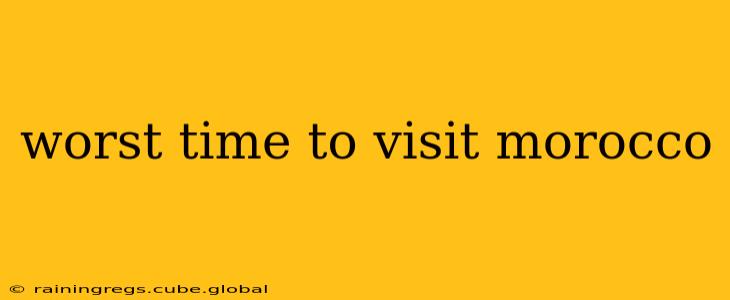Morocco, a land of vibrant souks, stunning landscapes, and rich culture, is a year-round destination. However, certain times of the year are less ideal than others due to weather conditions, crowds, and the overall tourist experience. This guide will help you determine the worst time to visit Morocco, considering various factors to ensure your trip is as enjoyable as possible.
What are the Worst Months to Visit Morocco?
While there's no single "worst" month universally agreed upon, July and August generally top the list for many travelers. The reasons are multifaceted:
-
Intense Heat: Temperatures soar across the country during these months, particularly in the desert regions and inland cities like Marrakech. The heat can be debilitating, making sightseeing uncomfortable and potentially impacting your health. This is especially true for those unaccustomed to such high temperatures.
-
Peak Tourist Season: Summer is peak tourist season, meaning larger crowds at popular attractions, higher prices for accommodation and tours, and less availability. The bustling atmosphere can detract from the overall experience for some travelers.
-
Ramadan (Timing Varies): Ramadan, the Islamic holy month of fasting, falls on different dates each year based on the lunar calendar. If Ramadan coincides with July or August, it can impact the availability of food and certain services, particularly in more conservative areas. While this can be a culturally enriching experience for some, it might be inconvenient for others.
What About the Shoulder Seasons?
While not as extreme as July and August, the shoulder seasons (spring and autumn) can still present some challenges:
-
Spring (March-May): While pleasant, spring can experience unpredictable weather, particularly in the mountainous regions. Rain showers are possible, and temperatures can fluctuate significantly.
-
Autumn (September-November): Similar to spring, autumn can have occasional rain showers and fluctuating temperatures. This is less of a concern than the summer heat but should still be considered.
Is Winter a Better Time to Visit?
Winter (December-February) offers a different set of considerations:
-
Cooler Temperatures: Winter brings cooler temperatures, especially in the mountainous regions. This can be pleasant for those seeking a less intense climate, but it's worth noting that some areas can experience occasional rain or even snow.
-
Fewer Crowds: Generally, winter sees fewer tourists than the summer months. This allows for a more relaxed sightseeing experience and potentially better deals on accommodation.
Frequently Asked Questions (FAQ)
Here are answers to some common questions regarding the best and worst times to visit Morocco:
What is the hottest month in Morocco?
July and August are typically the hottest months across most of Morocco. Temperatures can reach scorching levels, particularly in the southern and inland regions.
Is it too hot to visit Morocco in August?
For many travelers, August is too hot to comfortably enjoy many outdoor activities. However, if you prefer a less crowded experience and are prepared for extreme heat, it might still be manageable. Consider prioritizing air-conditioned accommodations and avoiding strenuous activities during the hottest parts of the day.
When is the rainy season in Morocco?
Morocco's rainy season is generally during the winter months, from November to March. However, rainfall is highly variable across the country and can be unpredictable.
When is the cheapest time to visit Morocco?
Generally, the shoulder seasons (spring and autumn) and the winter months (except during major holidays) offer better value for money regarding accommodation and flights.
What is the best time to visit the Sahara Desert?
The best time to visit the Sahara Desert is during the cooler months (October to April) to avoid the extreme heat of summer.
By carefully considering these factors and weighing your priorities, you can choose the optimal time to visit Morocco and make the most of your trip. Remember that flexibility and planning can greatly enhance your travel experience, regardless of the season.
